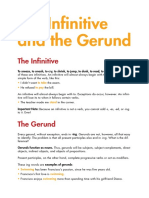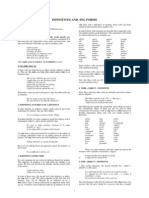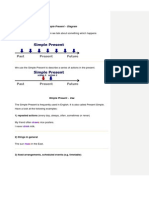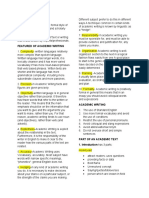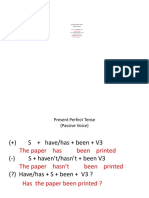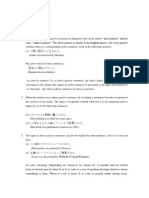0 ratings0% found this document useful (0 votes)
88 viewsGrammar 5 - Oxford
Grammar 5 - Oxford
Uploaded by
Nino KemertelidzeThis document discusses the different structures that verbs can be followed by in English, including -ing forms, infinitives, nouns, and that-clauses. It explains that some verbs can be followed by either an -ing form or infinitive with little change in meaning, while others change meaning depending on the structure. Some verbs can only be followed by an infinitive or that-clause, while others provide options. Understanding the different structures that follow verbs is important for proper usage of verbs in English.
Copyright:
© All Rights Reserved
Available Formats
Download as DOC, PDF, TXT or read online from Scribd
Grammar 5 - Oxford
Grammar 5 - Oxford
Uploaded by
Nino Kemertelidze0 ratings0% found this document useful (0 votes)
88 views13 pagesThis document discusses the different structures that verbs can be followed by in English, including -ing forms, infinitives, nouns, and that-clauses. It explains that some verbs can be followed by either an -ing form or infinitive with little change in meaning, while others change meaning depending on the structure. Some verbs can only be followed by an infinitive or that-clause, while others provide options. Understanding the different structures that follow verbs is important for proper usage of verbs in English.
Copyright
© © All Rights Reserved
Available Formats
DOC, PDF, TXT or read online from Scribd
Share this document
Did you find this document useful?
Is this content inappropriate?
This document discusses the different structures that verbs can be followed by in English, including -ing forms, infinitives, nouns, and that-clauses. It explains that some verbs can be followed by either an -ing form or infinitive with little change in meaning, while others change meaning depending on the structure. Some verbs can only be followed by an infinitive or that-clause, while others provide options. Understanding the different structures that follow verbs is important for proper usage of verbs in English.
Copyright:
© All Rights Reserved
Available Formats
Download as DOC, PDF, TXT or read online from Scribd
Download as doc, pdf, or txt
0 ratings0% found this document useful (0 votes)
88 views13 pagesGrammar 5 - Oxford
Grammar 5 - Oxford
Uploaded by
Nino KemertelidzeThis document discusses the different structures that verbs can be followed by in English, including -ing forms, infinitives, nouns, and that-clauses. It explains that some verbs can be followed by either an -ing form or infinitive with little change in meaning, while others change meaning depending on the structure. Some verbs can only be followed by an infinitive or that-clause, while others provide options. Understanding the different structures that follow verbs is important for proper usage of verbs in English.
Copyright:
© All Rights Reserved
Available Formats
Download as DOC, PDF, TXT or read online from Scribd
Download as doc, pdf, or txt
You are on page 1of 13
Verbs followed by – ing or infinitive 1
When we learn a new verb, it is advisable to check in a dictionary whether
it is followed by the -ing form (also called the gerund) or an infinitive with
or without to. If the infinitive is without to, it is called a bare infinitive.
Verbs followed by -ing or infinitive: little or no change of
meaning
- Some verbs can be followed either by an -ing form, or to + infinitive,
and there is little or no change in meaning. Such verbs are:
Begin, continue, not bear, hate, intend, like, love, prefer, start.
When she stood up, the President began to speak/speaking.
Some people at the back continued to chat /chatting.
I can’t bear to listen/listening for a long time.
What do you intend to do/doing about it?
I don’t like watching television. I prefer to read.
I think you should start to practice/practicing now!
- There can be a small difference between like to do and like doing.
To + infinitive suggests that something is a good idea although you don't
necessarily enjoy it.
I like to have а short walk after my evening meal.
The -ing form shows you enjoy something.
I like listening to the radio.
- We prefer one thing to another thing. If the things are activities,
the –ing form is used.
I prefer reading to watching TV.
BUT
I prefer to watch TV.
- Hate doing is more common, except in the fixed expressions.
I hate doing the washing-up!
I hate to tell you this, but we’ve missed the last train!
- When we us the modal verb would with like, love, prefer and hate, we
must use to + infinitive.
I’d like to go to Portugal this summer.
I’d prefer to do it myself, if you don’t mind.
Verbs followed by to + infinitive
- Some verbs can only be followed by the infinitive with to. These verbs
are: afford, ask, choose, happen, help, manage, offer, refuse, wait, want,
etc.
I can’t afford to go to the cinema twice in one week.
In the end, Laura chose to study Economics.
Do you happen to know the time?
Could someone help me to carry this?
OR
Could you help me carry this?
Jim can’t manage to come this evening.
I offered to give her а lift, but she said she’d ordered a taxi.
The manager refused to see me.
There are some people waiting to see you.
What do you want to do this evening?
Verbs followed by to + infinitive or that-clause
- Some verbs can be followed by the infinitive with to, or a that-clause.
It is possible to leave out that in everyday speech. These verbs are:
agree, decide, expect, hope, learn, pretend, promise, seem, wish, etc.
We decided to go home. We decided (that) we would go home.
Mike expects to win. Mike expects (that) he will win.
I hope to see you later. I hope (that) I’ll see you later.
Helen pretended to be ill. Helen pretended (that) she was ill.
- There is a small difference between learn to and learn that.
At school Graham learned to speak French. (Learn a skill)
At school we learned that the Earth goes round the Sun. (Learn
information)
- The two forms of seem: It + seem + that-clause is very common.
You seem to know the answer!
It seems that you know the answer.
- Wish followed by to + infinitive has a similar meaning to want.
I wish to leave early today.
Wish followed by a that-clause usually includes would or could.
I wish (that) I could leave early.
I wish (that) my teacher would let me leave early.
Verbs followed by – ing or infinitive 2
Verbs followed by -ing or infinitive: change of meaning
- Some verbs can be followed either by an -ing form, or to + infinitive,
and there is a change in meaning.
- Remember and forget
We use remember/forget doing (or remember/forget followed by that-
clause) for memories of the past (the action happens before the
remembering).
I remember telling you!
Then I remembered that you were out.
I’ll never forget learning to drive.
We use remember/forget to do for actions someone is/was supposed to
do (the remembering happens before the action).
Remember to take your keys!
Sorry, I forgot to post your letter.
- Mean
We use mean doing (or mean followed by that-clause) when one thing
results in or involves another.
Keeping fit means taking exercise every day!
When I miss the bus, it means that I have to walk to school.
We use mean to do to express an intention.
Jan meant to watch the program but she forgot.
- Stop
We use stop doing when we end an action.
Jo has stopped learning French (= gave up learning).
We use stop to do when we give the reason for stopping.
We stopped to look at her (= in order to look).
Stop is not flowed by a that-clause.
- Try
We use try doing when we do something and see what happens.
If you have a headache, try taking two of these pills (= experiment)
We use try to do when we make an effort to do something, but don’t
necessarily succeed.
Peter tried to lift the table, but it was too heavy (he failed in this case).
Try is not followed by a that-clause.
Verbs followed by -ing or infinitive without to: change of
meaning
- Some verbs can be followed by an object + ing, or an infinitive without
to. There is a change in meaning. These verbs are: feel, hear, listen to,
see, watch, etc.
- If we see or hear only part of the action, or it continuous, we use
the –ing form.
I could feel my hands shaking with fear! (Continuous action)
We watched Joe eating his lunch. (Part of the action)
If we see or hear the whole action from beginning to end, we use the
infinitive without to.
I felt the building move! (Completed action)
We watched Joe eat his lunch. (Whole action)
- These verbs can be used with that-clause with a change of meaning.
I feel that this is the time to resign. (= believe)
We heard that you were ill. (= receive news)
I saw that it was too late. (= realize)
Verbs followed by -ing or noun
Some verbs can be followed by another verb in –ing form or a noun. These
verbs are: dislike, enjoy, fancy, can’t help, keep, mind, practice, can’t stand,
etc.
I dislike going out in the rain.
I dislike my new boss.
Everyone enjoys going to parties.
I enjoyed this lesson.
Do you fancy going to the cinema?
I fancy а swim!
Verbs followed by -ing or noun or that-clause
- Some verbs can be followed by another verb in –ing form or a noun or
a that-clause. These verbs are: admit, deny, imagine, suggest, etc.
The Minister admitted taking а bribe.
Paul admitted that he was wrong.
Tina denied stealing the money.
Both men denied that they had done anything wrong.
Imagine travelling to another planet!
Do you really imagine that I want to see you again?
I suggest going for а pizza.
I suggest that we go for а pizza.
- Suggest can also be followed by should.
I suggest that we should go for а pizza.
Assignment: Section 9 (with all exercises)
You might also like
- ESL - English as a Second Language - Verbs: a QuickStudy Digital Reference GuideFrom EverandESL - English as a Second Language - Verbs: a QuickStudy Digital Reference GuideNo ratings yet
- English Grammar ExplanationsDocument13 pagesEnglish Grammar ExplanationsНикола Каранфиловски100% (3)
- 9093 Scheme ResourceDocument64 pages9093 Scheme ResourceKeya Nandi67% (3)
- 403 Infinitive or - Ing Form To InfinitiveDocument7 pages403 Infinitive or - Ing Form To InfinitiveMagdallena MariaNo ratings yet
- Grammar TestDocument21 pagesGrammar TestAlina MaksimenkoNo ratings yet
- Infinitives GerundsDocument5 pagesInfinitives GerundsBush OromoNo ratings yet
- Infinitive and The GerundDocument8 pagesInfinitive and The GerundSergoSanikidze100% (2)
- VERB + - Ing If These Verbs Are Followed by Another Verb, The Structure Is: Verb + - IngDocument9 pagesVERB + - Ing If These Verbs Are Followed by Another Verb, The Structure Is: Verb + - IngAdela MărgineanuNo ratings yet
- Infiniteves & - Ing Forms EFL MaterialDocument6 pagesInfiniteves & - Ing Forms EFL MaterialJaryn CapekNo ratings yet
- Verbs Followed by Ing of InfDocument4 pagesVerbs Followed by Ing of InfteacherflorcaramNo ratings yet
- Gerund or Infinitive C1Document2 pagesGerund or Infinitive C1Fi CNo ratings yet
- Verb PatternsDocument3 pagesVerb PatternsAnita Madunovic100% (1)
- The Use of Gerunf and Infinitive in Comtemporary EnglishDocument16 pagesThe Use of Gerunf and Infinitive in Comtemporary EnglishJ FNo ratings yet
- Module One GrammarDocument36 pagesModule One GrammarMohammed IbdahNo ratings yet
- Eng Gram Mod 5 TensesDocument5 pagesEng Gram Mod 5 Tensesvikas1onlyNo ratings yet
- Present Simple Vs Present ContinuousDocument16 pagesPresent Simple Vs Present ContinuousNisrine Idrissi ChouahdiNo ratings yet
- TENSESDocument19 pagesTENSESAryanNo ratings yet
- Tenses English GrammarDocument50 pagesTenses English GrammarAbhishek TiwariNo ratings yet
- A3n1v Wu1w9Document20 pagesA3n1v Wu1w9yolandafragaNo ratings yet
- TENSES Ingles 3rd ESODocument4 pagesTENSES Ingles 3rd ESOM. Eulalia Montero GarcíaNo ratings yet
- Module One Grammar.Document50 pagesModule One Grammar.Mohammed IbdahNo ratings yet
- Grammar Reference: Verb Patterns: Gerunds and InfinitivesDocument3 pagesGrammar Reference: Verb Patterns: Gerunds and InfinitivesThiago DinizNo ratings yet
- Some Verbs Can Be Followed Immediately by A To-InfinitiveDocument6 pagesSome Verbs Can Be Followed Immediately by A To-InfinitiveIsabella VidoNo ratings yet
- ETP (Week 2) + KeyDocument30 pagesETP (Week 2) + Keythinthinhlaing22392No ratings yet
- Gramática Adverbs of Frequency (In Hierarchy Order) : Gerunds and InfinitivesDocument10 pagesGramática Adverbs of Frequency (In Hierarchy Order) : Gerunds and InfinitivesmmpmsNo ratings yet
- T5 - Gerunds and InfinitivesDocument18 pagesT5 - Gerunds and InfinitivesnachotudelaNo ratings yet
- Used To + Infinitive' and Be/get Used To'Document2 pagesUsed To + Infinitive' and Be/get Used To'Arnold LamaduaNo ratings yet
- Infinitive and GerundDocument5 pagesInfinitive and GerunddathuynhyonNo ratings yet
- English Lessons Political and International StudiesDocument34 pagesEnglish Lessons Political and International StudiesMeryem MkiraNo ratings yet
- I2ci Grammar 8 Verbs Ing or InfinitiveDocument15 pagesI2ci Grammar 8 Verbs Ing or InfinitiveDanielSánchezMartínezNo ratings yet
- Buat Ujian BinggrisDocument35 pagesBuat Ujian BinggrisFranklyn Goklas ManullangNo ratings yet
- GerundsDocument7 pagesGerundsAdriana IbarraNo ratings yet
- Explanations: It's Not Worth Waiting For A Bus at This Time of DayDocument6 pagesExplanations: It's Not Worth Waiting For A Bus at This Time of DayBianca Ioana TomulescuNo ratings yet
- Infinitive GerundDocument3 pagesInfinitive GerundJuanita Dientes VerdesNo ratings yet
- Gerund - InfinitiveDocument10 pagesGerund - InfinitiveLinh ThânNo ratings yet
- The Present Tense Simple I. Formation RulesDocument14 pagesThe Present Tense Simple I. Formation RulesGigiEnergieNo ratings yet
- Parts of Speech and TensesDocument54 pagesParts of Speech and TensesJeevan KumawatNo ratings yet
- Ing or InfinitiveDocument2 pagesIng or Infinitivemilenerato2240No ratings yet
- Pertemuan 6Document12 pagesPertemuan 6Reza AndikaNo ratings yet
- GerundioDocument10 pagesGerundioGrecia NogueraNo ratings yet
- Verbs Followed by - Ing Clauses: Verbs of Liking and DislikingDocument6 pagesVerbs Followed by - Ing Clauses: Verbs of Liking and DislikingRosa FyqNo ratings yet
- Rules For Infinitives and GerundsDocument2 pagesRules For Infinitives and GerundsPaulina MoyaNo ratings yet
- Verbs Followed by Gerund or Inf.Document3 pagesVerbs Followed by Gerund or Inf.balmaalonso9No ratings yet
- Gerund 2Document2 pagesGerund 2Lucia CighirNo ratings yet
- GrammarDocument2 pagesGrammarAna Paola Matiasso CruzNo ratings yet
- Level 5 - Unit 1: My Class NotesDocument6 pagesLevel 5 - Unit 1: My Class NotesDani AliquintuiNo ratings yet
- Verb Patterns in EnglishDocument5 pagesVerb Patterns in Englishpedroarana100% (1)
- Curso InglesDocument44 pagesCurso InglesagussperezzNo ratings yet
- 4 Past Tenses in English With ExamplesDocument12 pages4 Past Tenses in English With ExamplesJojo LeaonNo ratings yet
- InfinitiveDocument22 pagesInfinitiveДарья РустамоваNo ratings yet
- Summary of EnglishDocument10 pagesSummary of Englishfernanda23enfNo ratings yet
- Grammar ReviewDocument40 pagesGrammar ReviewMarina MaloivanNo ratings yet
- Simple PresentDocument69 pagesSimple Presentkhaiyang123No ratings yet
- Gerund Infinitive Explanation in ClassDocument4 pagesGerund Infinitive Explanation in ClassSerrano Zurita LucasNo ratings yet
- Verbos Seguidos de Ing o To b2Document6 pagesVerbos Seguidos de Ing o To b2FranNo ratings yet
- Verbs PatternsDocument47 pagesVerbs PatternsrbrojoNo ratings yet
- In English There Is Two Types of Verbs, Dyanmic and StativeDocument21 pagesIn English There Is Two Types of Verbs, Dyanmic and StativetriplelouNo ratings yet
- Grammer Fourth Year Power PointDocument60 pagesGrammer Fourth Year Power PointMaryam HazemNo ratings yet
- Esercizi Di GrammaticaDocument9 pagesEsercizi Di GrammaticalauraNo ratings yet
- EAPP ReviewerDocument3 pagesEAPP ReviewerJodi RempilloNo ratings yet
- Assessing Speaking IELTS - p2-3Document2 pagesAssessing Speaking IELTS - p2-3Breda HayesNo ratings yet
- Write Questions Using Wh-Question Words and The Present Continuous of The Verbs in ParenthesesDocument21 pagesWrite Questions Using Wh-Question Words and The Present Continuous of The Verbs in ParenthesesRaphael BarturenNo ratings yet
- ENC101 Draft 1Document13 pagesENC101 Draft 1HIEU NGUYEN TRUNGNo ratings yet
- THE THEORIES OF LANGUAGE LEARNING (Behaviorism, Chomskys LAD) - For StudentsDocument9 pagesTHE THEORIES OF LANGUAGE LEARNING (Behaviorism, Chomskys LAD) - For StudentsAmelia MustikailahNo ratings yet
- MCQ of Soft SkillsDocument5 pagesMCQ of Soft Skillsmasoom rajaNo ratings yet
- Beginner Unit 2bDocument2 pagesBeginner Unit 2bMr. ZackNo ratings yet
- 321sanskrit IntroDocument156 pages321sanskrit IntrogogoNo ratings yet
- Present Perfect Tense (Active Voice) (+) S + Have/has + V3 (-) S + Haven't/hasn't + V3 (?) Have/has + S + V3Document17 pagesPresent Perfect Tense (Active Voice) (+) S + Have/has + V3 (-) S + Haven't/hasn't + V3 (?) Have/has + S + V3kawanalip cantikNo ratings yet
- Lllil: Second Book of Basic Japanese WritingDocument92 pagesLllil: Second Book of Basic Japanese Writingflorecita skdNo ratings yet
- Parts of Speech For Business Sorting 2020Document2 pagesParts of Speech For Business Sorting 2020Sai GuyoNo ratings yet
- Current IssuesDocument2 pagesCurrent Issuesdon.mhammed100% (1)
- B1 Grammar - Connecting WordsDocument4 pagesB1 Grammar - Connecting WordsSamer dawanNo ratings yet
- Semester 1 GrammarDocument29 pagesSemester 1 GrammarsolekeNo ratings yet
- Perspektif Antropologi Dan Teori Komunikasi: Penelusuran Teori-Teori Komunikasi Dari Disiplin AntropologiDocument20 pagesPerspektif Antropologi Dan Teori Komunikasi: Penelusuran Teori-Teori Komunikasi Dari Disiplin AntropologiRafliardiNo ratings yet
- NEW CBA SCHEME OF WORK FOR 4eDocument8 pagesNEW CBA SCHEME OF WORK FOR 4eLouis Blènard NgheunackNo ratings yet
- The Patient Puppy 2Document6 pagesThe Patient Puppy 2missarvy21No ratings yet
- Unit 0 - Writing - Word Order PDFDocument11 pagesUnit 0 - Writing - Word Order PDFJọjịí TạNo ratings yet
- Participle ClausesDocument3 pagesParticiple Clauses17. Lê Mỹ Khánh Linh 1022No ratings yet
- BE (Am, Is, Are) Do / Does Go (Es) Have / Has Make (S) : Infinitive Past Simple Past Participle TranslationDocument3 pagesBE (Am, Is, Are) Do / Does Go (Es) Have / Has Make (S) : Infinitive Past Simple Past Participle TranslationMontseNo ratings yet
- Taiwan Linguistics Olympiad 2024 Problems (En) PDFDocument8 pagesTaiwan Linguistics Olympiad 2024 Problems (En) PDF林濬祺No ratings yet
- TenseDocument2 pagesTenseKlaudia TerjékNo ratings yet
- Is Bad Language Unacceptable On TV ActivityDocument16 pagesIs Bad Language Unacceptable On TV ActivityKay Kay Mauryn Manangap0% (3)
- Course: Applied Linguistics Techniques and Principles in Language TeachingDocument345 pagesCourse: Applied Linguistics Techniques and Principles in Language TeachingJorge Taveras100% (1)
- An Analysis of President Donald TrumpDocument4 pagesAn Analysis of President Donald TrumpJAYBEIFEL FRONDANo ratings yet
- Text To Speech: A Simple Tutorial: D.Sasirekha, E.ChandraDocument4 pagesText To Speech: A Simple Tutorial: D.Sasirekha, E.ChandraAkorede OlasunkanmiNo ratings yet
- Foreign Language SWIT 1corse1semDocument5 pagesForeign Language SWIT 1corse1sembv4dy4fykkNo ratings yet
- Passive voice 受身文Document2 pagesPassive voice 受身文DubraskaNo ratings yet






